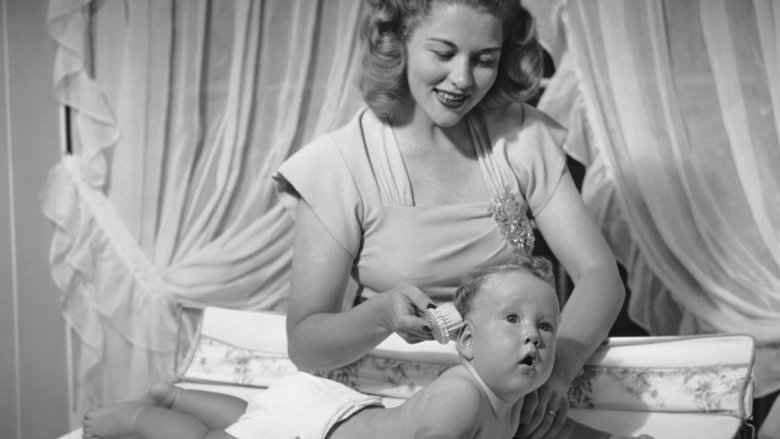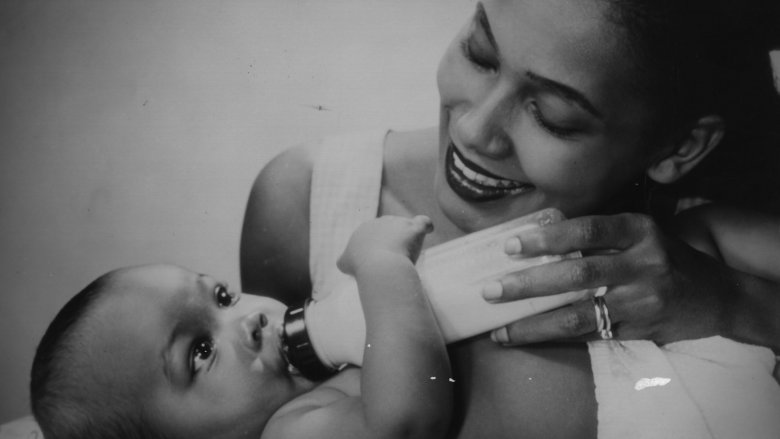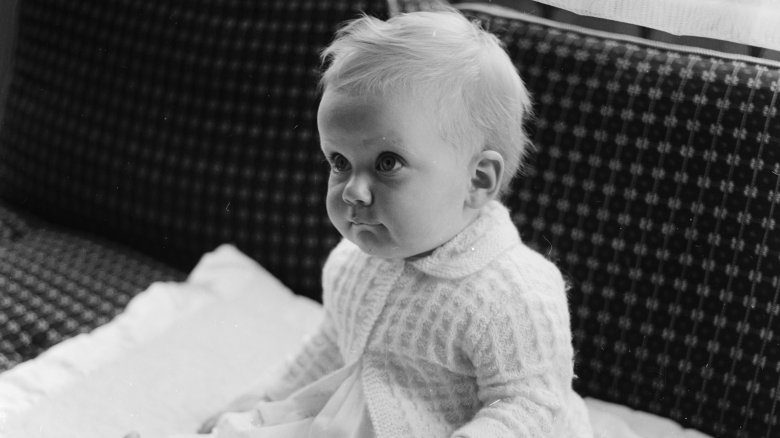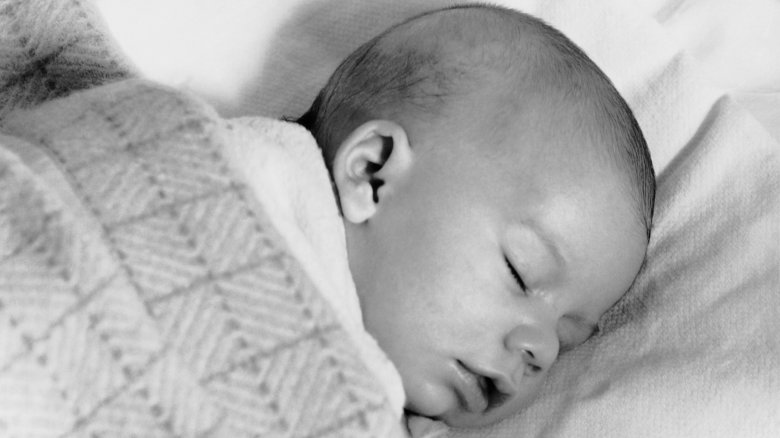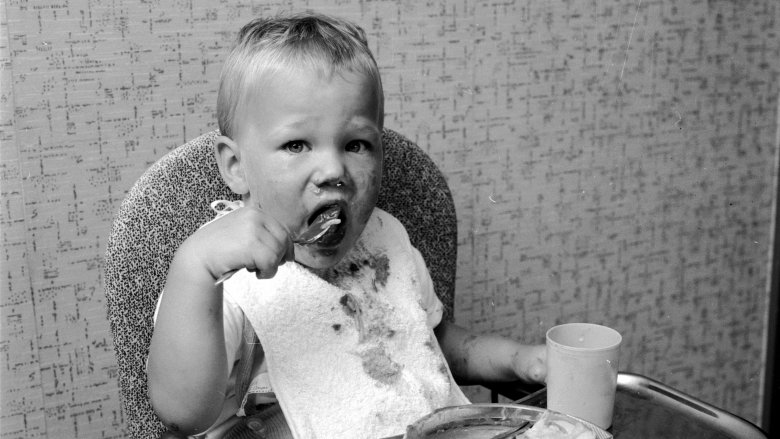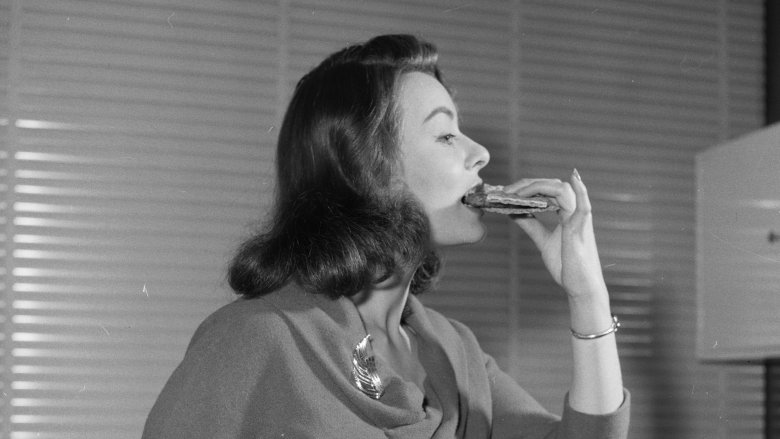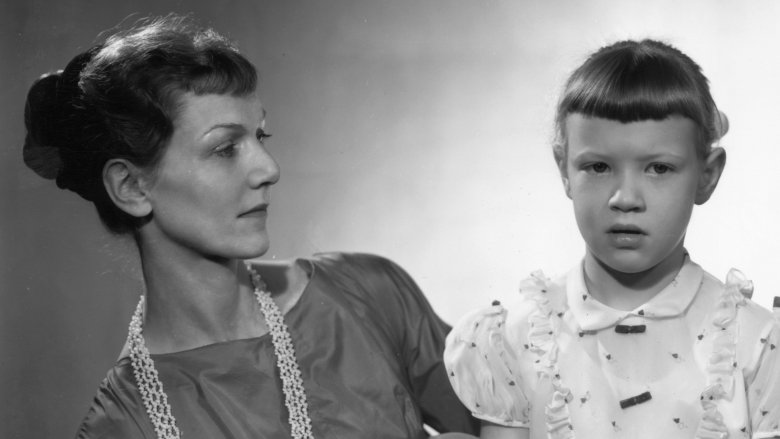Ridiculous Claims Parenting Books Made 50 Years Ago
As soon as you have a kid, unsolicited advice often comes rolling in. Whether it's from well-meaning friends, family members, coworkers, or really anyone who thinks they know a thing or two about raising kids, you're going to be subjected to a ton of anecdotes. And, as a new parent, you may want guidance — just not from, well, novices. And you're not alone.
Expert parenting books actually date as far back as the 1660s, according to Parent Co., and they've been the go-to for parents ever since. In 1693, John Locke wrote Some Thoughts Concerning Education in which he shared a quip that stands the test of time: "Before I got married I had six theories about bringing up children; now I have six children and no theories." Of course, not all parenting advice has aged that well. You won't believe the sort of ridiculous claims parenting books made in just the last 50 years.
Why wait to start your baby on solid food?
In 1962, Dr. Walter Sackett published his "expert" parenting advice in the book Bringing Up Babies; A Family Doctor's Practical Approach to Child Care. Even then, most experts agreed to introduce solid foods gradually, and only start when the babies were at least several months old. Sackett, however, disagreed. He reasoned by acknowledging the custom called "mummins" practiced in Alabama and Mississippi. He had also "heard [it] exists" in Florida among Native Americans, South Africa, the West Indies.
So, what exactly is this custom good 'ole Dr. Sackett touted? Premastication — basically, how adult birds feed their young. You know, by chewing food, and then regurgitating it for their babies. Except, humans simply chew — no regurgitating involved, thank goodness. Although Sackett does not specifically recommend premastication, he points to it as an early and healthy practice of feeding solids to infants and goes on to recommend feeding solids to children at two to three days old!
Sackett also quite savagely called out other doctors for not recommending parents feed infants solids, writing, "I suspect that those authorities who claim that muscles for swallowing solid food are not properly developed until four months of age ... have made this idea up in their own minds and have never actually tried feeding solids to a newborn." Well, unfortunately for Sackett (but fortunately for babies), modern science continues to advocate starting solid foods after four months old.
Medicine is great, but being a good citizen is more important
Sackett didn't simply advise feeding cereal to newborns — oh, no — he had many more opinions. Above all else, Sackett valued morality. He wrote that medicine is secondary to ensuring your child becomes a "good citizen."
Sackett quoted the Rules for Raising Juvenile Delinquents published by the Houston police department, which included picking up after your child and giving in to your child's (or baby's) wants. Ben J. Sheppard, M.D., LL.B, agreed, writing in the foreword of Bringing Up Babies, "The sooner a child realizes he is only a small part of society, the better off he will be."
If it sounds preposterous, that's probably because it is. According to Psychology Today, the most important thing you can ever give your baby is unconditional love (AKA not whipping your child into shape, so to speak, with constant tough love). Actually, that unconditional love you provide will, in turn, foster emotional intelligence. And, if you raise an emotionally intelligent child, there's a good chance he or she will not only grow up into a upstanding citizen, but will also be more likely to achieve success in all areas of their life.
Stomach-sleeping is best
Bringing Up Babies wasn't the only book that provided ill-advised, though well-intentioned, advice. According to a comprehensive review published by the International Journal of Epidemiology, publications from the 1940s all the way to the 1990s recommended infants to be put to sleep laying on their stomach, sometimes termed stomach-sleeping or front-sleeping. Sadly, over 60,000 lives in just the United States, Europe, United Kingdom, and Australasia may have been saved from Sudden Infant Death Syndrome (SIDS) had parents known what we know now — that children should only be put to sleep on their backs.
The review highlighted two studies that were actually conducted back in the '50s, one in the United States in 1956 and the other in the United Kingdom in 1958, to measure the sleeping positions of both SIDS victims and unaffected infants. This was the very same time period when stomach-sleeping became popular and highly recommended. SIDS was then explained away with other assumed causes of death, like infection or aspiration.
Thankfully, a campaign with a name you are probably quite familiar with, "Back-to-Sleep," was formed in 1994 by multiple health organizations. This campaign strongly encouraged parents to put their babies to sleep on their backs as opposed to their stomachs. According to the American Academy of Pediatrics, research has now shown that back-sleeping increased from just 17 percent in 1993 to a whopping 73 percent in 2010. By the same token, the number of SIDS-related deaths has decreased dramatically.
Introduce coffee and tea after your child's first birthday
On your first birthday, you were undoubtedly shoveling that glob of icing-rich cake in your mouth with one hand, while adorably knocking back some sippy-cup espresso with the other. No? That's not how it went? Well, if your first birthday had been in 1963, you may have actually washed your cake down with a warm caffeinated beverage.
In addition to advising mothers that their baby "should be weaned away from fat-containing milk entirely" by their first birthday, Bringing Up Babies introduced another novel idea: Once you take away the milk, "the youngster should be ... getting his liquids in the form of fruit and vegetable juices, soups, water, nonfat dry milk, and the gradual introduction of tea and coffee." No, you didn't read that wrong.
Before you write this advice off as nonsense for the sheer fact that it's outdated, it's important to note that this was also pretty ludicrous in its own day. Knowing this, author Sackett wrote, "Don't scream when you find me recommending tea and coffee for babies. Yes, I know they contain caffeine, and that caffeine is a drug." Sackett's reasoning? Since caffeine was also in cola beverages, and parents often gave those to children, he felt the tea and coffee was healthier as it didn't contain sugar. The lesser of two evils, perhaps? Nowadays, we have a lot more insight into what babies should and shouldn't eat. Not only should your little ones not consume caffeine, but expectant mothers should reduce their caffeine intake.
Play ball!
The modern book 1950s Mother takes readers back in time and reveals some of the wacky advice spouted in that decade. One example is Mabel Liddiard's The Mothercraft Manual. Liddiard initially went in a pretty reasonable direction, urging that "Motherhood is a natural normal event and not an illness." As a nurse and midwife, Liddiard wanted women to continue their everyday lives. Certainly not bad advice in the right context with the proper caveats. However, her specific recommendation to spend copious amounts of time outdoors — regardless of weather conditions — was extreme, and possibly harmful.
Modern advice urges expectant mothers to be mindful of the weather, especially during the summer. Midwife Denise Gershwin wrote for The Bump that pregnant women should be particularly vigilant when spending time outside during the hottest part of the day or for extended periods of time to avoid getting dehydrated.
Liddiard also shared advice about exercise. Her thinking was that if a woman played sports before becoming pregnant, why not just continue to participate as if nothing's changed? We now know that, while exercise is important during pregnancy, some sports should be avoided. Dr. Michele Hakakha, gynecologist, explained on parents.com that any high-impact sport that carries a risk of either collision or falling (think horseback riding, softball, volleyball, etc.) should be put on hold until after giving birth.
We can't help but wonder how many women went into labor while sliding into home back in the '50s.
Labor calls for ... whisky highballs?
The American Pregnancy Association recommends that all pregnant women come up with a birth plan — a fairly simple document stating your preferences during labor and delivery. What an expecting mother chooses is up to her, although, naturally, there are limits if something may pose a risk to the mother or child.
One birth plan that would surely get denied in the 21st century was published in the book Come Gently, Sweet Lucina by Patricia Carter in 1956. According to Rixa Ann Spencer Freeze's thesis "Born Free: Unassisted Childbirth In North America," Carter endorsed natural labor, though her description of this term was completely opposite to how we think of it today. Carter fully believed giving birth should be free of pain and shouldn't involve any hard work. She believed those things were unnatural. She referred to this type of labor as "pro-instinct birth" and "brainless, will-less birth." Thankfully, those terms didn't stick.
Carter's other ideas were pretty out there. She promoted the idea of having a small baby for an easier birthing experience. Throughout her own pregnancy she only wanted to gain five pounds, so she dieted, took laxatives, and smoked cigarettes. She also recommended drinking large amounts of alcohol during labor to "release inhibitions, relax muscles, and supply energy." Her drink of choice? A whisky highball, of course. Perhaps that was the real secret to a "brainless, will-less birth."
You can smoke up to 10 cigarettes a day while pregnant
The fact that times have changed is perhaps no more apparent than after taking a look at the leading medical textbook of 1966, Williams Obstetrics. According to Smoking and Pregnancy: The Politics of Fetal Protection by Laury Oaks, some studies had already been conducted, prior to 1966, to figure out what, if any, risks came from smoking during pregnancy. Although doctors recognized a link between cigarette-smoking and low birthweight, they didn't feel low birthweight was necessarily harmful. To be on the safe side, Williams Obstetrics cautioned, "It is, nevertheless, recommended that excessive smoking be avoided during pregnancy." The book continued, "10 cigarettes or fewer per day during pregnancy are quite likely innocuous." If you say so, doc.
Of course, people now know that smoking is not just harmful to fetuses, but to everyone who takes up the vice. Not only that, but secondhand smoke can also cause a variety of health problems. The American Pregnancy Association even warns against thirdhand smoke, which refers to the invisible toxins that remain in your clothes and furniture long after the smoke has disappeared. Babies are especially susceptible to these toxins because their brains are continually developing. So, zero cigarettes a day (plus avoiding smoky public spaces) would actually be the correct way to play it safe these days.
Liver is great, but don't you dare eat bruised potatoes!
Have you ever heard that it's bad to eat bruised potatoes? If so, it's probably leftover advice from the 1970s. According to Rediscovering Birth by Sheila Kitzinger, in the 1970s, women in the United States and Britain were advised that eating bruised potatoes could potentially cause major birth defects. Naturally, these women stopped eating potatoes. The cautionary tale may stem from the fact that a natural toxin (glycoalkaloids) is produced by all potatoes. According to the UK's Food Standards Industry, potatoes only contain a low level of this toxin. That said, it's incredibly rare to be poisoned by the toxin they produce.
Ironically, in the '70s, bruised potatoes were a no-go but, as Rediscovering Birth explained, "liver was promoted as an ideal food for an expectant mother." That was problematic because liver is rich in vitamin A and it can be very dangerous to fetuses. "High concentrations can cause birth defects," Kitzinger wrote. In addition to consuming a lot of liver, there was also a trend in the '60s and '70s to take massive amounts of vitamins during pregnancy — which could all be bought over the counter. Some pregnant women were consuming the dangerous vitamin in every way possible — through food, drops, and tablets. Thankfully, women now have a great excuse to never eat liver ... at least while pregnant.
Spanking is better than nagging
Ridiculous parenting claims can be traced as far back as the bible. Remember the idiom, "spare the rod, spoil the child"? However, by 1946, the practice of corporal punishment was just starting to become old hat. According to an excerpt of Dr. Benjamin Spock's 1946 edition of Baby and Child Care, published by The New York Times, it's clear the public perception of physical punishment was shifting. "In the olden days," he wrote, "children were spanked plenty, and nobody thought much about it. Then a reaction set in, and parents were taught that it was shameful."
However, just because it was considered shameful didn't mean people necessarily stopped doing it. Like Sackett's advice to give your kid coffee over soda, Spock chose the lesser of two evils in childrearing. He figured if a parent who didn't spank his child instead vented his frustration through nagging and cutting remarks throughout the day, then perhaps it was best to just spank the child. Hmm. "I'm not advocating spanking," he clarified, "but I think it is less poisonous than lengthy disapproval, because it clears the air for parent and child."
Blowing off steam via spanking is not exactly the same thing as "clearing the air," but at least he wasn't advocating for all-out butt whoopings, right? Spock did eventually change his tune when he released the 1985 edition of his book, which is essentially: silly parents, spanks aren't for kids.
